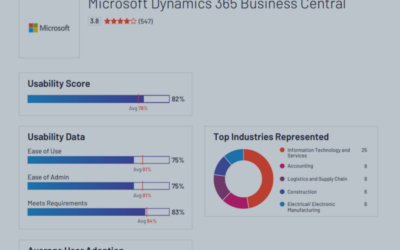First, it’s important to note that Enterprise Resource Planning software (ERP) allows organizations to manage their business processes. This includes everything from accounting, inventory management, human resources, to supply chain management. These systems help to integrate and automate various functions across different departments. Thus, leading to increased efficiency and improved decision-making. If you’ve been shopping for an ERP, you may have been looking into both cloud-based and hosted versions. The difference between cloud and hosted ERP can be nuanced. So, understanding which works best for your business requirements isn’t always straightforward. To begin, let’s try to define each then transition into the benefits of working with either approach.
Cloud ERP and Hosted ERP—What are They Exactly?
Now, let’s discuss the differences between hosted and cloud-based solutions. At their heart, both hosted and cloud ERP solutions offer access to data and programs that are hosted on a server. Where they differ is in where the server doing the hosting exists.
With a hosted solution, the client organization does not need to invest in any server hardware or employ a dedicated IT team. Instead, a third-party provider, such as Intelligent Technologies, Inc., maintains the hardware needed for the ERP on their premises, often a data center. Users then access the solution via a Virtual Private Network (VPN) and remote desktop services. This requires the installation of the software application on desktops at the client’s location.
Cloud ERP software is hosted on a server that is accessed over the internet. The end user accesses the solution using a web browser, such as Internet Explorer, Firefox, Chrome, Safari, and so on. This means that the client still does not need to purchase or maintain any hardware.
The vendor manages the software application. The end user needs nothing beyond their work computer and an internet connection to access the ERP solution.
Which is the best fit for your company?
Here are some points to consider when choosing between cloud and hosted ERPs.
Customization: Sometimes, a cloud-based ERP system may not offer as many customizable or industry-specific features. But most cloud-based ERP vendors offer a wide range of configurable options to meet the needs of most organizations.
Additionally, some cloud ERP vendors offer API access or other tools that allow for custom integrations with other systems or software. A hosted ERP system may offer more detailed customization options, but this can also lead to higher costs and longer implementation times.
On-site Skillsets: Cloud-based ERP systems typically require less on-site IT staff. Rather, these software vendors manage the hardware and software for you. This can be a significant advantage for smaller companies with limited IT resources.
A hosted ERP system may require a dedicated IT team to manage the hardware and software, adding overhead costs to the implementation and ongoing maintenance of the system. This may be more suitable for larger companies with robust IT departments.
Cost: A cloud-based ERP system is often less expensive than a hosted solution. This is because it does not require on-premise hardware or a dedicated IT staff to manage it. Vendors often sell cloud-based ERP systems on a software as a service (SaaS) subscription basis. This equates to lower upfront costs and predictable ongoing costs.
A hosted ERP system may have higher upfront costs because of the need for hardware and software implementation, and ongoing maintenance costs for the dedicated IT staff.
Scale of the Company: Small to medium-sized businesses can generally benefit from the simplicity and flexibility of a cloud-based ERP system. These systems are easily scalable, with the ability to add or remove users and features as needed. As a company grows and its needs become more complex, they can easily scale a hosted ERP system to handle the increased workload and more intricate workflows.
Collaboration: Thanks to their inherent ease of access, a cloud-based ERP system may offer more opportunities for collaboration. Consider how you plan to use the system. For example, if the ERP system is primarily used by a small team or department, collaboration may not be a significant factor.
Summing Up
In conclusion, the decision to choose between cloud and hosted ERP systems depends on a variety of factors that vary from one organization to another. Both solutions offer access to data and programs that are hosted on a server but differ in terms of where the server doing the hosting exists. Factors such as customization, on-site skill sets, cost, scale of the company, and collaboration are important to consider when making this decision.
Ultimately, the choice between cloud and hosted ERP systems should be based on the specific needs and requirements of the organization. Smaller organizations or those with limited IT resources may find cloud-based ERP systems more appealing because of their simplicity and affordability, while larger organizations with complex requirements may prefer the flexibility and customization options of a hosted solution. By carefully evaluating the advantages and disadvantages of each option, organizations can make an informed decision that best meets their needs and supports their growth and success.
Want an expert perspective to help you decide whether a cloud or hosted ERP is best for your business? Schedule your one-on-one consultation today. In this no strings attached 30-minute call, we’ll discuss your needs, budget, timeline and recommend smart solutions to help you reach your business goals.




